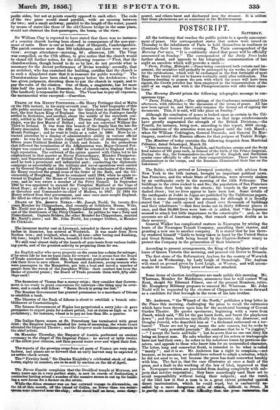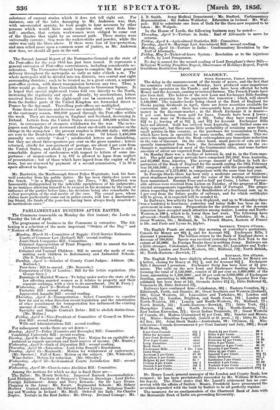Mr. Anderson, " the Wizard of the North," publishes a
long letter in the Times this morning, challenging the press to recall the calemnies which have been thrown upon him for the accidental burning of Covent Garden Theatre. He quotes specimens ; beginning with a verse from Punch, which. said, "He let the gas burst forth, and brunt the playhouse down"' and then mentions specifically the Spectator, the Examiner, and Douglas Jerrold, who described him as " a. firebrand enthroned on a tar- barrel." These are not by any means the sole censors, but he seeks to confront " only powerful journals." He confesses that hs is "a juggler_," —" I accept the basin and balls " ; but heavers that no one can deny his being an honest man_ He asks whether any of his actors or tradespeople harm mat had their own ; he refers to his notorious losses by previous dis- asters, and appeals to those who know him for an untarnished character. The letter, long and somewhat florid, is intended to be what is called "manly" ; and it is so. Mr. Anderson has a right to complain,—not because, as he assumes, we should have refused to admit a rebutter,
_which he did not send to us, but because the press has dealt somewhat harahly with him. The fact is, that the case illustrates at once a fault of the press, and a fault in the working of the law of libel, improved as that is. Newspaper-writers are precluded from dealing completely. with sub- jects that involve imputation; they have accordingly used their art to avoid responsibility without losing their subjects; and the result of the libel law is that a man is to a. great extent protected against, direct incrimination, which he could repel, but is exclusively as+ sailed by a more dangerous style of attack, diffieult to fence. It
is partly on account of this thatd. the prow latiumuttt„ the substance of current stories which it does not tell right out. For instance, one of the tales damaging to Mr. Anderson was, that, with unconcealed anxiety, he took people , to hear accounts by other persons which would have made suspicion slant away from him- self : another, that certain workwomen were obliged to come out of the theatre that night by an unusual path. These stories were Universally current ; they were the rocket-sticks and powder, while the satire was only the blaze above. If there were less of law-protection, and men relied more upon a common sense of justice, as Mr. Anderson now does, we should all gain in the end.



























 Previous page
Previous page